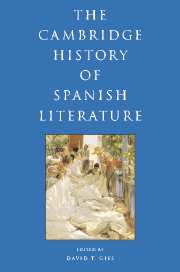Book contents
- Frontmatter
- I INTRODUCTION
- II HISTORY AND CANONICITY
- III THE MEDIEVAL PERIOD
- IV EARLY MODERN SPAIN: RENAISSANCE AND BAROQUE
- 7 Renaissance and Baroque: continuity and transformation in early modern Spain
- 8 Religious literature in early modern Spain
- 9 Renaissance poetry
- 10 The antecedents of the novel in sixteenth-century Spain
- 11 Miguel de Cervantes
- 12 The making of Baroque poetry
- 13 The development of national theatre
- 14 Lope Félix de Vega Carpio
- 15 Pedro Calderón de la Barca
- 16 Didactic prose, history, politics, life writing, convent writing, Crónicas de Indias
- V THE ENLIGHTENMENT AND NEOCLASSICISM
- VI THE FORGING OF A NATION: THE NINETEENTH CENTURY
- VII THE MODERN, MODERNISMO, AND THE TURN OF THE CENTURY
- VIII TWENTIETH-CENTURY SPAIN AND THE CIVIL WAR
- IX IN AND OUT OF FRANCO SPAIN
- X POST-FRANCO SPANISH LITERATURE AND FILM
- Bibliography
- Index
- References
7 - Renaissance and Baroque: continuity and transformation in early modern Spain
from IV - EARLY MODERN SPAIN: RENAISSANCE AND BAROQUE
Published online by Cambridge University Press: 28 March 2008
- Frontmatter
- I INTRODUCTION
- II HISTORY AND CANONICITY
- III THE MEDIEVAL PERIOD
- IV EARLY MODERN SPAIN: RENAISSANCE AND BAROQUE
- 7 Renaissance and Baroque: continuity and transformation in early modern Spain
- 8 Religious literature in early modern Spain
- 9 Renaissance poetry
- 10 The antecedents of the novel in sixteenth-century Spain
- 11 Miguel de Cervantes
- 12 The making of Baroque poetry
- 13 The development of national theatre
- 14 Lope Félix de Vega Carpio
- 15 Pedro Calderón de la Barca
- 16 Didactic prose, history, politics, life writing, convent writing, Crónicas de Indias
- V THE ENLIGHTENMENT AND NEOCLASSICISM
- VI THE FORGING OF A NATION: THE NINETEENTH CENTURY
- VII THE MODERN, MODERNISMO, AND THE TURN OF THE CENTURY
- VIII TWENTIETH-CENTURY SPAIN AND THE CIVIL WAR
- IX IN AND OUT OF FRANCO SPAIN
- X POST-FRANCO SPANISH LITERATURE AND FILM
- Bibliography
- Index
- References
Summary
Each term used to describe the period in which Spain saw a burgeoning of new ideas and new literary forms that helped create a brilliant flowering of prose, poetry, and drama brings with it a distinct view of how that period is to be conceptualized and evaluated. The “Golden Age” refers now by common consent to the literature of both the sixteenth and seventeenth centuries, but critics in previous centuries, excluding on aesthetic grounds seventeenth-century literature from the canon of truly “great” national literature, applied the term only to the sixteenth. Applied now to both centuries it suggests a unified period, not uncoincidentally conterminous with Habsburg rule in Spain (1516–1700), in which differences are outweighed by similarities, the latter often amounting simply to an uncritical notion of literary “greatness” thought applicable to both centuries. In contrast, the terms “Renaissance” and “Baroque” suggest a view of Golden Age literature in which, due to changing intellectual, cultural, and political factors, each century has its own characteristic literary and intellectual ethos. This is what will be argued here, but such a view is especially contentious to those who see the Baroque as a problematic label precisely because, as an anachronistic term developed initially to describe the visual arts, there is little consensus as to its meaning. Its value outweighs the problems inherent in its usage, however, for it not only serves to distinguish seventeenth-century culture from that of the preceding century, but links Spain very broadly to international trends, thereby countering what has long been a forceful element in Spanish historiography, namely the view of Golden Age Spain as intellectually and culturally isolated.
- Type
- Chapter
- Information
- The Cambridge History of Spanish Literature , pp. 135 - 148Publisher: Cambridge University PressPrint publication year: 2005



